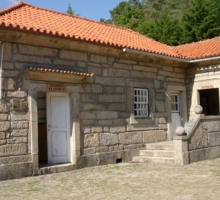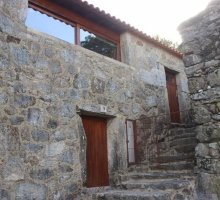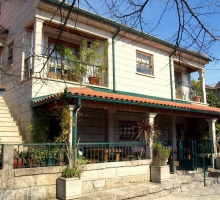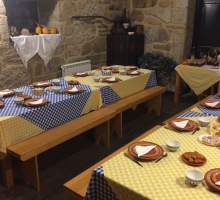The Mountain Routes integrate themselves into areas of high natural and ethnographic value, in this sense these itineraries aim to contribute to the harmonious and balanced use of these mountains regions. Only resorting to the traditional pastoral mountain signalling - the “mariolas” (a 3 stones artificial mount indicating direction). The Routes are designed for walkers / climbers perfectly integrated in its environment and connoisseurs of the progression techniques, which will allow to see and feel the mountain ecosystem.
The agro-pastoral exploitation process of mountains regions, the rational use of existing resources; found, in the articulation of the different historical, physical, social, economic and cultural contexts, a wide diversity of responses to the level of territorial organization.
In their current state, they are local heritage of archaeological importance in the strict sense, and current imperatives are focused towards the understanding the relationship between people, places and their cultural identity.
Besides other physical evidence engraved by successive generations into the mountains face they also embody mooring anchors to the past, that the enormous inertia of mentalities and social behaviour keep as being a latent symbolism, which touches us as the discovery of a family secret.
Successes like the creation of paths and mountain’s sidewalks, driving systems, distribution and water retention, the delimitation sometimes walling the wasteland, the colossal task of building retaining walls for terracing land, the construction of shelters and seasonal dwellings and the structuring of “brandas” and corrals or the execution of the wolf‘s den monuments, were fully achieved with the use of animal power and outflow of resources. A unique heritage legacy, imposing, breath-taking, unique...
Points of interest:
Travanca
Currais Velhos
Branda de Bragadela
Fojo de Bragadela
Pedrada
Branda da Seida
Fojo da Seida
Typology: “Rotas de Montanha” (Mountain’s Route)
Length: 10 km
Duration(hours – approximate): 6h00
Type of tread: Sidewalks and trucker’s ways
Degree of difficulty: Hard
Starting point: Travanca, Mezio – “Cabana Maior”’s village
Arrival: Branda da Seida – “Soajo”’s village
Location: Arcos de Valdevez
The agro-pastoral exploitation process of mountains regions, the rational use of existing resources; found, in the articulation of the different historical, physical, social, economic and cultural contexts, a wide diversity of responses to the level of territorial organization.
In their current state, they are local heritage of archaeological importance in the strict sense, and current imperatives are focused towards the understanding the relationship between people, places and their cultural identity.
Besides other physical evidence engraved by successive generations into the mountains face they also embody mooring anchors to the past, that the enormous inertia of mentalities and social behaviour keep as being a latent symbolism, which touches us as the discovery of a family secret.
Successes like the creation of paths and mountain’s sidewalks, driving systems, distribution and water retention, the delimitation sometimes walling the wasteland, the colossal task of building retaining walls for terracing land, the construction of shelters and seasonal dwellings and the structuring of “brandas” and corrals or the execution of the wolf‘s den monuments, were fully achieved with the use of animal power and outflow of resources. A unique heritage legacy, imposing, breath-taking, unique...
Points of interest:
Travanca
Currais Velhos
Branda de Bragadela
Fojo de Bragadela
Pedrada
Branda da Seida
Fojo da Seida
Typology: “Rotas de Montanha” (Mountain’s Route)
Length: 10 km
Duration(hours – approximate): 6h00
Type of tread: Sidewalks and trucker’s ways
Degree of difficulty: Hard
Starting point: Travanca, Mezio – “Cabana Maior”’s village
Arrival: Branda da Seida – “Soajo”’s village
Location: Arcos de Valdevez






